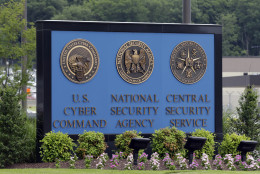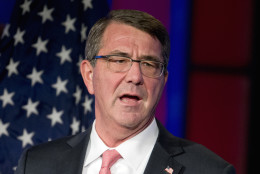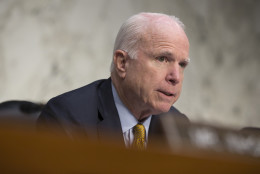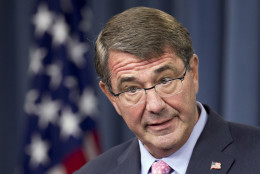Senate Armed Services Committee
-
The National Security Agency is preparing for an organizational change that will prepare future leaders for global threats.
December 16, 2015 -
The Senate Armed Services Committee is holding hearings on less prominent Defense officials after a long stalemate over a congressional rule change.
December 10, 2015 -
Based on the work of two study groups, the Pentagon is likely to ask Congress to revise two key statutes underlying its personnel management system for military officers: the Goldwater-Nichols Act and the Defense Officer Personnel Management Act.
December 10, 2015 -
Defense experts urge the Senate Armed Services Committee to consider adding more flexibility to current promotional structures for military and civilian personnel. The Defense Officer Personnel Management Act, which Congress passed in 1980, is too outdated, they said.
December 03, 2015 -
The Defense Department is spending more money and getting less out of it, defense analysts told Congress.
November 23, 2015 -
Nearly 30 years after Congress passed the largest reform in Defense Department’s history via the Goldwater-Nichols Act, the Senate on Tuesday reopened the topic of Pentagon organization in what may turn into another multi-year process of study and legislating over how the world's largest military force is managed.
November 11, 2015 -
Testifying before the Senate Armed Services Committee, former Defense Secretary Robert Gates acknowledged the rationale for reforms which centralized big decisions within the DoD acquisition system.
October 22, 2015 -
The annual National Defense Authorization Act (NDAA) Congress sent to President Barack Obama on Tuesday contains nearly 100 separate provisions intended to reform the Defense Department's acquisition system. But that’s just the start, say Capitol Hill’s top two Defense legislators.
October 20, 2015 -
The Senate Armed Services Committee called on the Defense Department to create a cyber defense policy. Members said they were concerned about a lack of definitive plans in case of a major cyber attack against the United States. All of this happened as the U.S. and China signed an agreement to stop cyber theft. Federal News Radio reporter Scott Maucione tells In Depth with Francis Rose more about Congress' concerns.
October 02, 2015 -
Defense Secretary Ashton Carter said Wednesday that he has advised President Barack Obama to veto the Defense Authorization bill Congress will vote on later this week for several reasons.
October 01, 2015 -
The Defense Authorization Act will expand milestone decision authority for military service chiefs, it just has to get past President Obama first.
September 30, 2015 -
Secretary of Defense Ash Carter has told several audiences in recent weeks that he’s trying to drill tunnels through the “wall” that sits between the Defense Department and commercial innovators.
September 14, 2015 -
Gen. Mark Milley said at his confirmation hearing to become the new Army chief of staff that his service still could meet the demand signal for Army forces, despite recent budget cuts. That could change, though, if demands continue to increase and if budgets continue to decrease.
July 22, 2015 -
Sen. John McCain (R-Ariz.), chairman of the Senate Armed Services Committee, said he thinks negotiators from the House Armed Services Committee and his committee will wrap up their discussions within the next week or so. Language on defense procurement in both bills is part of the negotiation going on right now between the two committees. Jon Etherton, principal of Etherton & Associates, explains the similarities and differences in the two bills on In Depth with Francis Rose.
July 01, 2015 -
Ashton Carter, President Barack Obama's nominee to be the next Defense secretary, told senators that cost overruns and needless overhead spending 'must stop,' but so must arbitrary caps on Defense spending.
February 05, 2015









